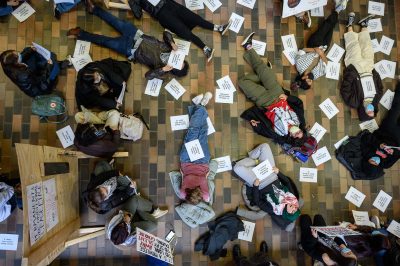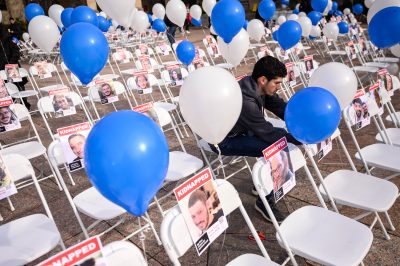Boston University students held demonstrations across campus on Dec. 1, following the end of the cease-fire between Israel and Hamas in Gaza.

Students for Justice in Palestine held an “Emergency Die-In” at the George Sherman Union, to amplify the group’s demands to the BU administration.
At the demonstration, SJP called for a permanent cease-fire. The group also demanded that BU disclose and divest from apartheid profiters and make a strict statement against harassment on campus, especially “on the grounds of islamophobia, anti-Arab, anti-Palestinian, and antisemitism,” according to the organization’s Instagram post.
“This is an emergency sit-in for the people of Gaza to raise awareness for the current genocide that’s going on,” said Adam Benzinane, a junior in the College of Communication. “We’re having a die-in in the GSU because we want to be very public-facing about our beliefs and our views.”
Students read the names of Palestinian civilians killed and held signs. The students chanted the phrase “murder by the Israeli government and America” with each name read.
Benzinane said the demonstration seeks to increase awareness about the people who have been killed in the Gaza Strip.
“We’re trying to make their names known,” he said.
Students opposing the demonstration began to play the Israeli national anthem, the “Hatikvah,” along with other Hebrew songs, halfway through the demonstration. The songs were played on a speaker while SJP continued to read the list of names and chant.
A police blockade was formed separating the two groups.
BU Spokesperson Colin Riley declined to comment on the demonstration.
BU Students for Israel set up a display earlier that day, of chairs pasted with photos of hostages taken by Hamas at Marsh Plaza. Balloons of blue and white colors were tied to the chairs.

Yonatan Manor, BU Students for Israel president and a junior in COM, said the demonstration aims to commemorate the hostages kidnapped by Hamas.
“We’re praying for them and their healing and we’re basically just bringing awareness to it,” he said. “Many people here at Boston University aren’t very deeply connected to this issue, but the Jewish community is hurting.”
Shayna Dash, a sophomore in Wheelock College and recruitment chair for BUSI, said she hopes that the display will bring awareness to the polarization on college campuses right now.
“You can be pro-Israel and be against Hamas, a terrorist organization,” she said. “I think people should be allowed to express those opinions.”
Amanda Koppelman, a junior in the College of Engineering, shared what playing the “Hatikvah” meant for the Israeli community.
“That’s a song that we all know together,” she said. “During this whole time, the uniting song for us is our national anthem.”
Koppelman explained that the display at Marsh Plaza of the hostages and those who have been released is evident that the Jewish community wants peace.
“Sometimes, it doesn’t seem like it’s portrayed that way by other people who don’t support Israel,” she said. “It’s very difficult as Jews together to be the only group of people fighting for ourselves and that’s what it’s starting to feel like and it’s very isolating.”
Athene LaJeunesse, a junior in COM, said the GSU demonstration is important to make people aware of the ongoing violence Palestinian people continue to face.
“It’s hard to remain upset for so long about something and it’s easy to become desensitized,” she said. “I think we want to remind people that it’s still happening, and it’s still just as bad as it was in the beginning.”
LaJeunesse said the counter protesters were unsurprising.
“We expected the police presence that is here,” she said. “It’s disappointing to see but none of it surprising.”
Faisal Ahmed, a senior in the College of Arts and Sciences, said the actions taken by the SJP were necessary.
“People don’t want to be lying down in the GSU, with a microphone saying things,” he said. “But it seems like that’s what it takes to get people to stop and look and hear about something.”
Ahmed also said the counter protests seemed to be “provocative.”
“In terms of us being able to do what we were trying to do, I think we were able to accomplish that with the relative composure that we needed,” he said.
Since early October, there have been hundreds of demonstrations at colleges and universities across the country.
Last month, MIT students were suspended for protesting the war by taking over a campus building and refusing to leave by a set deadline, according to CBS. Individuals were also arrested at demonstrations at both Brandeis University and Brown University.
On BU’s campus, Ilai Blaustein, a senior in Questrom School of Business, said there is importance in both events happening on the same day.
“It’s very important to take a look at our surroundings and see what’s going on around us,” said Blaustein. “To me, the fact that these two demonstrations happened on the same day was very fitting.”
Sydney Topf contributed to the reporting of this article






















































































































Ilana Golberg • Dec 6, 2023 at 2:29 pm
I find this “die – in” a gross and tone deaf display of insincerity. While death is a reality for many innocent Israeli and Palestinian civilians ever since Hamas terrorists attacked innocent Israeli civilians on October 7th and took 240+ hostage, these students are abusing their privilege of freedom of speech to spread hateful rhetoric and misinformation as well as abusing their privilege of LIFE as they pretend to be dead. Death is NOT a display and this “demonstration” for lack of better term to describe whatever it is these students think they are doing could not be any more abhorrent and disrespectful, they have really reached a new low.
Francis McGillicuddy • Dec 8, 2023 at 9:34 am
To be clear, Ilana: Freedom of speech is a *right* in the United States of America, not a privilege. Just as you have the right to share your opinions in this comment section — however popular or unpopular they may be — those students have the right to demonstrate in support or opposition of whatever causes they want to, in whatever manner of speech they want to.